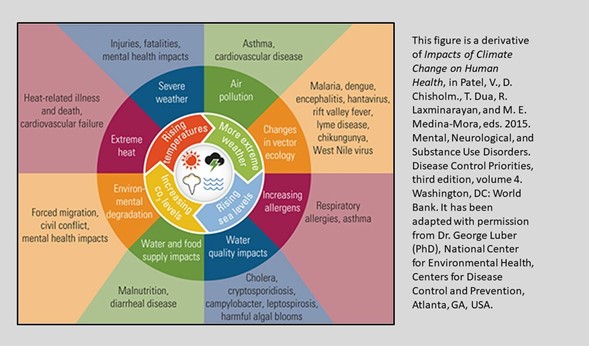
There is no doubt that our changing climate is a growing health security concern.
During unprecedented high temperatures and hot weather this summer there were an estimated 2,803 excess deaths in England amongst those aged over 65.
Looking forward it’s projected that numbers of heat related deaths will triple by 2050, with the hottest summers we’re now seeing on record simply becoming “normal” summers.
Across the world climate change poses one of the greatest health security threats we face, potentially impacting the air we breathe, the quality and availability of our food and water, the risk of infectious diseases and wider impacts on our mental health and wellbeing.
UKHSA and our predecessor agencies have been studying and adapting to the health impacts of climate change for many years, whether that’s our work on extreme weather through to surveillance programmes to understand the changing disease risk posed by mosquitoes and ticks.
But as a new agency with a greater focus than ever on the impact health emergencies can have across the whole of society, now is the time to take this agenda to the next level.
At UKHSA’s conference we will be launching a new Centre for Climate and Health Security within UKHSA to lead our efforts to protect health in the context of a changing climate and provide a focus for partnerships and collaborations with academia, local authorities and other public sector organisations
Under the leadership of its new head, Professor Lea Berrang Ford, the Centre will add real value to our partners and colleagues, offering scientific advice and support to ensure that the impacts of climate change are considered and embedded in the design and delivery of climate change policies across local and national government and with international partners.
Using UKHSA’s links locally, nationally and internationally we will increase awareness of the impacts of climate change on public health, build the evidence base and then mobilise it to inform policy development.
To date we’ve identified a range of resources that we believe will add value to decision-makers including providing easier online access to knowledge and evidence, toolkits to shape local action and the provision of metrics and indicators that track, measure and analyse the health impacts of climate change.
But to ensure these will work in practice in all settings, we will engage with local and national government colleagues to ensure that the Centre provides useful and usable resources that can inform decision-making.

Next steps for the Centre
We have a busy agenda over the coming year as we seek to establish the Centre as the hub of climate and health security work for the health protection system.
We are currently contributing to the 3rd National Adaptation Programme overseen by DEFRA which sets out the actions that the government and others will take to adapt to the challenges of climate change in England over a five-year period.
Linked to this, the Centre will publish a Single Adverse Weather and Health Plan next year. This replaces the Heatwave and Cold Weather Plans for England and provides updated guidance on cold and hot weather, drought and flooding informed by scientific evidence nationally and internationally.
And next year we will also publish the fourth iteration of Health Effects of Climate Change in the UK, a landmark report produced periodically and last published in 2012, which provides analysis of a range of threats to our health.
Drawing on the experience and expertise of our partners is key to our ambition to provide genuinely actionable evidence and guidance.
We look forward to working with you over the coming months and years as we adapt to and protect communities from the impacts of climate change to save more lives and protect our economy.
